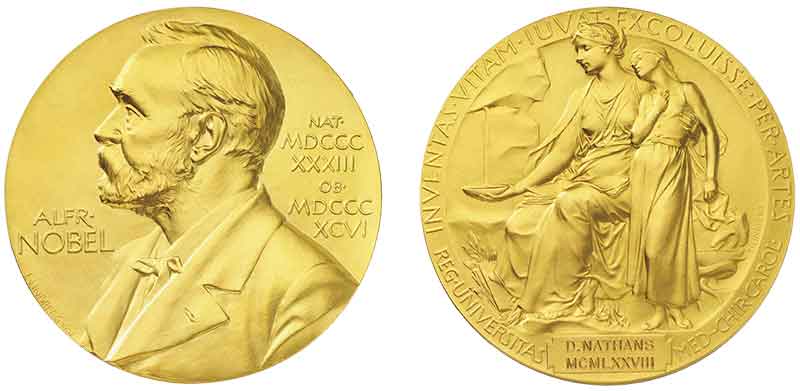Nobel Prizes truly fascinate people around the world. From the legacy of Alfred Nobel to the selection process. From the award money to the aura of being the most respected honor in the world. Nobel Prizes have it all to cast their magic on the world. Thus, it should not really come as a surprise that Nobel Prizes have a lot of interesting facts associated with them. These facts make for the cool trivia as well as great General Knowledge questions. Today we are publishing a list of such interesting facts. Ride with us!
Interesting Facts about Nobel Prizes
- Malala Yousafzai is the youngest Nobel Prize winner. She won the Nobel Peace Prize in 2014 at the age of 17 years.
- John B. Goodenough became the oldest Nobel Prize winner when he won prize in Chemistry 2019 at the age of 97 years.
- Marie Curie is the only woman who won the Nobel Prize twice! She won the Nobel Prize in Physics 1903 and Nobel Prize in Chemistry in 1911.
- She was the first woman to win a Nobel Prize.
- Marie Curie was the first person to win two Nobel Prizes.
- She is the only person to have won two Nobel Prizes in two different scientific fields.
- Linus Pauling is the only person to have been awarded two unshared Nobel Prizes – the 1954 Nobel Prize in Chemistry and the 1962 Nobel Peace Prize.
- How much is the Nobel Prize money? Well, at present each prize comes with 9 million Swedish kronor (nearly one million US Dollars). If there are multiple winners, the prize money is divided among the recipients as per the decision of Nobel Committee.
- The first Nobel Prizes were given in the year 1901 in the fields of Physics, Chemistry, Medicine, Literature and Peace.
- Originally the Nobel Prizes were instituted by Alfred Nobel — a Swedish businessman, chemist, engineer, inventor, and philanthropist.
- The sixth prize, the Nobel Prize in Economic Sciences, was first given in 1969.
- Alfred Nobel invented dynamite.
- Alfred Nobel was the owner of the famous gun maker company Bofors.
- Although Nobel owned more than 355 patents, he made most of this fortune from the sale of weapons.
- A French had newspaper published Nobel’s premature obituary and condemned him for his invention of military explosives. Reading this obituary of himself, Alfred Nobel wrote his will and donated 94% of his total assets, 31,225,000 Swedish kronor, to establish the five Nobel Prizes.
- Monetary part of the Nobel Prize is given from the interest earned on the money left by Alfred Nobel for the prizes.
- Dag Hammarskjöld (Nobel Peace Prize 1961), the second Secretary-General of the United Nations, and Erik Axel Karlfeldt (Nobel Prize in Literature 1931) are the only two people who have been given Nobel Prize posthumously.
- Since 1974, the Nobel Prize is not given posthumously unless death occurs after the announcement of the Nobel Prize.
- So far, 27 organizations and 923 individuals have won the Nobel Prizes.
- The Prize in Economics is not one of the Nobel Prizes which were endowed by Alfred Nobel in his will. So, technically, the Economics Prize is not really a Nobel Prize.
- Only 9 Indians / People of Indian Origin have won a Nobel Prize.
- All Nobel Prizes are given in Stockholm, Sweden except for the Peace Prize. The Nobel Peace Prize is given in Oslo, Norway on 10th December, in presence of the King of Norway, on the death anniversary of Alfred Nobel.
- From 1901 to 2019, only 54 women have been honored with the Nobel Prize.
- Leon Lederman, the writer of the famous book The God Particle, won the Nobel Prize in Physics in 1988. He had to sell his medal for $765,000 to cover his medical bills costs in 2015.
- James Watson became the first laureate to have auctioned his Nobel medal. Watson sold the prize for 4.1 million US dollars in 2014.
- Jean-Paul Sartre and Le Duc Tho are the only two people to have declined the Nobel Prize.
- So far, six married couples have won the Nobel Prizes:
- Marie Curie and Pierre Curie (in Physics, 1903)
- Irène Joliot-Curie and Frédéric Joliot (in Chemistry, 1935)
- Gerty Cori and Carl Cori (in Medicine, 1947)
- May-Britt Moser and Edvard I. Moser (in Medicine, 2014)
- Alva Myrdal (in Peace, 1982) and Gunnar Myrdal (in Economics, 1974)
- Esther Duflo and Abhijit Banerjee (in Economics, 2019)
- The Curie family has won four Nobel Prizes: Marie Curie (2), Pierre Curie (1) and their daughter Irène Joliot-Curie (1)
- International organizations ICRC and UNHCR have won three and two Nobel Peace Prizes respectively.
Use the citation below to add this article to your bibliography
"25 Most Interesting Facts about Nobel Prizes." Dashamlav.com. Web. 1 May 2025. <https://dashamlav.com/nobel-prize-interesting-facts-trivia-quiz/>
Dashamlav.com, "25 Most Interesting Facts about Nobel Prizes." Accessed 1 May 2025. https://dashamlav.com/nobel-prize-interesting-facts-trivia-quiz/
"25 Most Interesting Facts about Nobel Prizes." (n.d.). Dashamlav.com. Retrieved 1 May 2025 from https://dashamlav.com/nobel-prize-interesting-facts-trivia-quiz/

